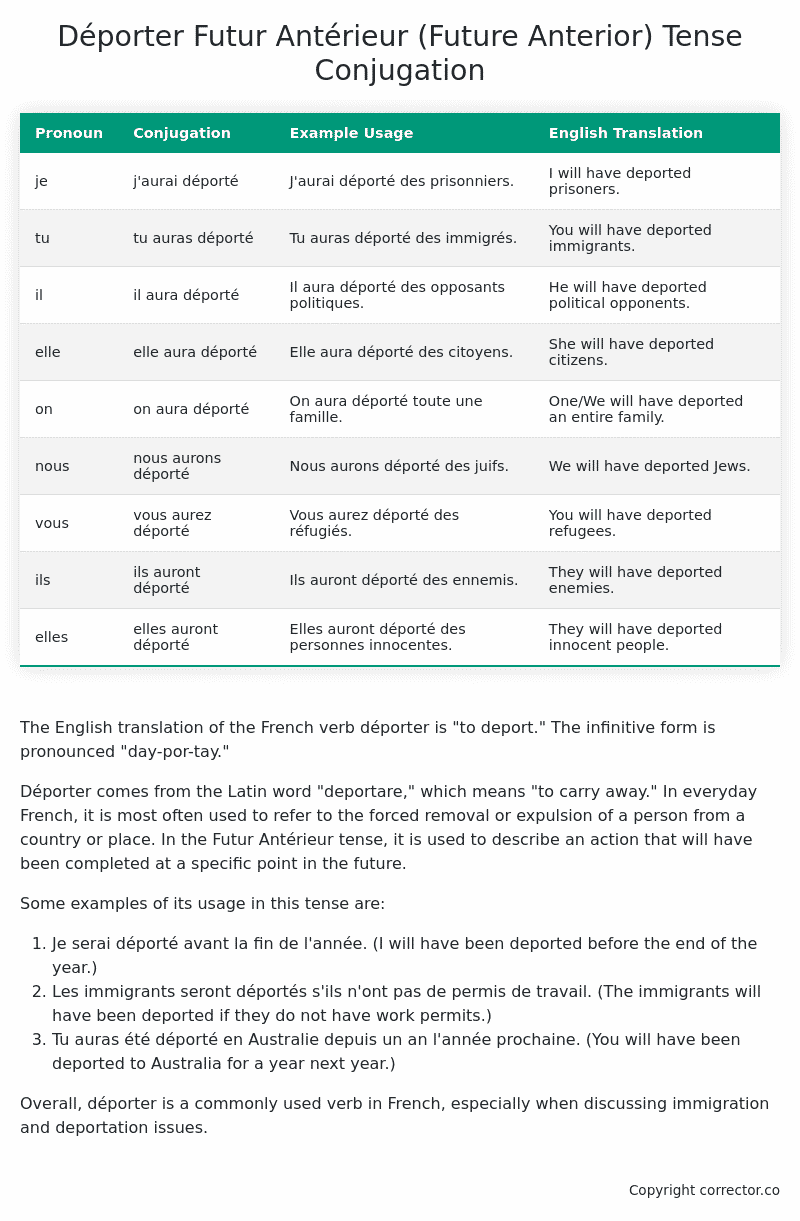Futur Antérieur (Future Anterior) Tense Conjugation of the French Verb déporter
Introduction to the verb déporter
The English translation of the French verb déporter is “to deport.” The infinitive form is pronounced “day-por-tay.”
Déporter comes from the Latin word “deportare,” which means “to carry away.” In everyday French, it is most often used to refer to the forced removal or expulsion of a person from a country or place. In the Futur Antérieur tense, it is used to describe an action that will have been completed at a specific point in the future.
Some examples of its usage in this tense are:
- Je serai déporté avant la fin de l’année. (I will have been deported before the end of the year.)
- Les immigrants seront déportés s’ils n’ont pas de permis de travail. (The immigrants will have been deported if they do not have work permits.)
- Tu auras été déporté en Australie depuis un an l’année prochaine. (You will have been deported to Australia for a year next year.)
Overall, déporter is a commonly used verb in French, especially when discussing immigration and deportation issues.
Table of the Futur Antérieur (Future Anterior) Tense Conjugation of déporter
| Pronoun | Conjugation | Example Usage | English Translation |
|---|---|---|---|
| je | j’aurai déporté | J’aurai déporté des prisonniers. | I will have deported prisoners. |
| tu | tu auras déporté | Tu auras déporté des immigrés. | You will have deported immigrants. |
| il | il aura déporté | Il aura déporté des opposants politiques. | He will have deported political opponents. |
| elle | elle aura déporté | Elle aura déporté des citoyens. | She will have deported citizens. |
| on | on aura déporté | On aura déporté toute une famille. | One/We will have deported an entire family. |
| nous | nous aurons déporté | Nous aurons déporté des juifs. | We will have deported Jews. |
| vous | vous aurez déporté | Vous aurez déporté des réfugiés. | You will have deported refugees. |
| ils | ils auront déporté | Ils auront déporté des ennemis. | They will have deported enemies. |
| elles | elles auront déporté | Elles auront déporté des personnes innocentes. | They will have deported innocent people. |
Other Conjugations for Déporter.
Le Present (Present Tense) Conjugation of the French Verb déporter
Imparfait (Imperfect) Tense Conjugation of the French Verb déporter
Passé Simple (Simple Past) Tense Conjugation of the French Verb déporter
Passé Composé (Present Perfect) Tense Conjugation of the French Verb déporter
Futur Simple (Simple Future) Tense Conjugation of the French Verb déporter
Futur Proche (Near Future) Tense Conjugation of the French Verb déporter
Plus-que-parfait (Pluperfect) Tense Conjugation of the French Verb déporter
Passé Antérieur (Past Anterior) Tense Conjugation of the French Verb déporter
Futur Antérieur (Future Anterior) Tense Conjugation of the French Verb déporter (this article)
Subjonctif Présent (Subjunctive Present) Tense Conjugation of the French Verb déporter
Subjonctif Passé (Subjunctive Past) Tense Conjugation of the French Verb déporter
Subjonctif Imparfait (Subjunctive Imperfect) Tense Conjugation of the French Verb déporter
Subjonctif Plus-que-parfait (Subjunctive Pluperfect) Tense Conjugation of the French Verb déporter
Conditionnel Présent (Conditional Present) Tense Conjugation of the French Verb déporter
Conditionnel Passé (Conditional Past) Tense Conjugation of the French Verb déporter
L’impératif Présent (Imperative Present) Tense Conjugation of the French Verb déporter
L’infinitif Présent (Infinitive Present) Tense Conjugation of the French Verb déporter
Struggling with French verbs or the language in general? Why not use our free French Grammar Checker – no registration required!
Get a FREE Download Study Sheet of this Conjugation 🔥
Simply right click the image below, click “save image” and get your free reference for the déporter Futur Antérieur tense conjugation!

Déporter – About the French Futur Antérieur (Future Anterior) Tense
Construction
Common Everyday Usage Patterns
Interactions with Other Tenses
For example
Summary
I hope you enjoyed this article on the verb déporter. Still in a learning mood? Check out another TOTALLY random French verb conjugation!


